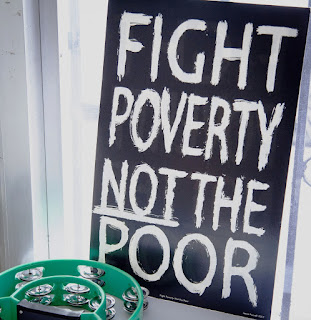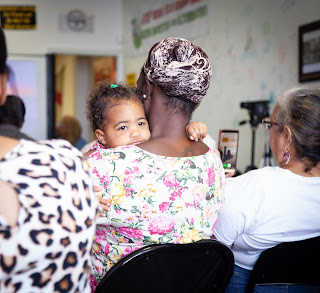Poor People's Campaign in the Glades
On Thursday, April 18, the Florida Poor People's Campaign held a field hearing in Belle Glade at the Sierra Club office as part of the National Emergency Truth and Poverty Tour organized by the Poor People's Campaign: A National Call for Moral Revival. The Poor People’s Campaign (PPC), originally led by Dr. Martin Luther King, Jr. has been revived under the leadership of Rev. Dr. William J. Barber, II and Rev. Dr. Liz Theoharis. PPC’s Moral Agenda addresses the following issues afflicting the poor: systemic racism, poverty and inequality, war economy and militarism, ecological devastation, and "our nation's distorted morality." The Belle Glade field hearing was the final stop of a week-long tour across Florida and was organized to allow local and regional elected decision makers to hear directly from their constituents. While no local electeds were present, attendees were pleased that U.S. Congressman Alcee Hastings sent an aide to listen and report back.
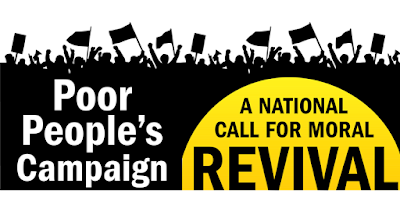
The field hearing began with words of wisdom and music shared by Seminole Tribe member Samuel Tommie, a resident of the Big Cypress Reservation. Tommie spoke about the need for the healing of the land, water and air, the sacredness of water to the Seminole people, his Tribe's long ties to the Everglades, and how much that unique ecosystem has suffered. He expressed concern over the poverty in the Glades region and the polluted water in nearby canals where he often sees people fishing. He blessed the audience by sprinkling water he brought from cypress domes in his reservation that black bears and panthers often drink. One of the flute songs he shared came to him during a long walk around Lake Okeechobee.
Steve Messam, a businessman, leadership development consultant, and associate pastor, born and raised in the Glades and the son of a Jamaican migrant sugar field worker, opened with a prayer, and then introduced the crowd to the injustice of the current sugar field burning regulations. He shared how affluent communities living east of the Glades are protected from the ash and smoke ("black snow") by wind-based burn restrictions while those living in the midst of the fields are not and how his family suffers from respiratory issues during cane burning season. He challenged the sugar industry to modernize by switching to green harvesting which would produce jobs and economic opportunity for his community. "We've always known there is a problem. It's just that since it's always been this way no one has been speaking up. Well, that's changed because we're here, we're not going anywhere, and we're just asking the industry to be good neighbors, stop burning, go green and let us be able to enjoy this community where we were born and raised and where we live, work and play..."

Daniel Jones, with the national Poor People's Campaign, recounted the immoral policies coming out of Tallahassee, and those who benefit from them. "They have a rich people's campaign coming after us, we need a poor people's campaign to counter that". His message of hope to the Glades was: "We see you, we love you, we support you and we want to figure out how do we build... the kind of power that can really start to change policies, start to change the narrative". Martin County resident Michael Panella shared that when 22 years old, he was among those that took part in the 1968 Poor People's Campaign in Washington DC. He said "it changed my life" and that it led him to dedicate his life to the civil rights movement. Panella's remarks were followed by the singing of the famous "Ain't Gonna Let Nobody Turn Me Around" song, with just a slight change in lyrics: "Ain't gonna let Big Sugar turn me 'round, I'm gonna keep on a walkin', keep on a talkin', marching up to freedom land."

Shanique Scott, former mayor and commissioner of the City of South Bay, and owner of a local youth dance studio, described hearing from her constituents who asked "what are we going to do about sugar burning?" She said "we have to wash our cars, no one is sending us checks for that... we have to pressure clean our homes.. It's a cost that is associated with injustice." Many of her dance students suffer from asthma and bring their breathing machines to practice. She shared her frustration when doctors say "you need to move" because of course not everyone has the option to move. She talked about the burning close to schools and homes and showed a photo she took of her neighbor's house when she honestly thought the house was on fire. She said the first time she heard of Sierra Club was from a sugar company itself and debunked the false claim that Sierra Club contacted her. She mentioned that the big sugar company owners don't live in the Glades, "their kids do not have to suffer from billows of smoke for 8 months...that's why I'm speaking up...whatever title I have, I'm going to speak up on behalf of the City of South Bay, Belle Glade, and Pahokee, because the Glades is where we live and this is our home."
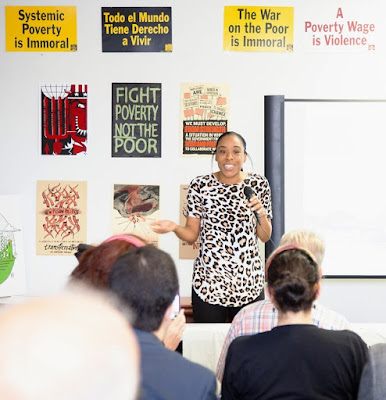
Kina Phillips, a sixth generation Glades resident, inspired all with her reasons for fighting against the burning: "I have to do the fight that I don't want my kids to do...I'm not going to leave...on them to fight something we should and our ancestors before us should have done already... The community says "Our Soil is Our Fortune" [but] we have allowed a company to come in and...kill us slowly with what belongs to us." She shared her concerns that their soil is disappearing because it's not being taken care of like it should and about pesticides sprayed by airplanes on the fields in her community. Phillips described how her daughter was a student at Rosenwald Elementary School when it had to be evacuated due to smoke from burning sugarcane fields around the school, and how she had to fight to get school improvements. She shared her frustration that the sugar companies get whatever they want because of the relationships they have with elected leadership that they help put in office. She said it's "racial injustice" that some people get protections and warnings while others do not and described how the industry has attempted to intimidate her personally. Lastly, she detailed how the industry sent out mailers full of false statements about Sierra Club but has never reached out to the local activists to invite them to the table: "They are trying to make it seem as though the Sierra Club .. brainwashed us... the Sierra Club didn't come at us, we went [to] Sierra Club". And then jokingly she said, "we probably brainwashed them into our stuff!"
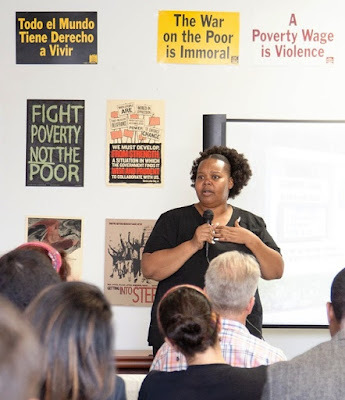
Colin Walkes, a former Mayor of Pahokee, shared how vital it is for the voices of the people, not the industry, to speak out and be heard because they do want change: "They speak it under the trees...in their cars...in their homes" but that it is very difficult to speak out freely if they feel their livelihood could possibly be threatened. He shared how his own family worked hard in the fields and some even died in them, and thanks to their sacrifices, their children didn't have to. He detailed how the community is trying to address preterm births and infant mortality, which happen at an alarming rate in the Glades. He believes that there are numerous environmental factors that could be contributing, including pregnant women being medicated with steroids for their respiratory issues and older houses with lead paint and asbestos.
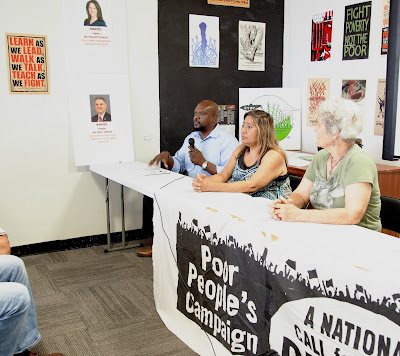
Maria Gonzalez, a Pahokee resident who provides family support at a daycare for children of migrant workers, the majority of whom work for the sugar industry, spoke passionately about the many kids suffering from asthma problems, but whose parents have a difficult time getting the help they need, and that many are afraid to speak out. She explained that a big area of need is educating them about their legal rights as immigrants, as is the lack of affordable housing; rents are too expensive. She often sees even three different families living together in small two-bedroom trailers. She recounted her advocacy attempts, thus far unsuccessful, to improve housing conditions for local workers and noted that Pahokee still has not recovered from Hurricane Irma, which continues to aggravate the longstanding problem. She spoke of her hopes that the Poor People's Campaign and the Sierra Club can help elevate their struggles.
Catherine Martinez, a Belle Glade resident actively involved with Palm Beach Chapter of the League of Women Voters spoke passionately about how "voting is power...politicians pay attention to communities that vote". She shared that it has been a challenge to get people registered and to come out to vote in the Glades but that addressing this challenge is critical to meet the needs of the people here. She rang the alarm about how the Florida legislature is considering laws that would weaken Amendment 4, which was passed by voters in 2017 to reinstate voting rights to ex-felons, and then closed her remarks with a prayer.
Rev Theoharris, Co-Chair of the Poor People's Campaign, via a recorded message, shared that movements begin with the telling of untold stories. She said that the country needs to hear them, weep and then take up action and that she believes that those gathered are part of the "new and unsettling force" that Dr. Martin Luther King spoke about.
Donna Cotterell with the Florida Poor People’s Campaign, who moderated the hearing, gave the closing remarks. She stated that our country has abundant resources to protect the environment and ensure dignified lives for all people and that the problem is one of priorities as more and more wealth flows into the pockets of a small but powerful few and into a bloated Pentagon budget. She then led all in a song to remind that we are indeed the "new and unsettling force" and that "we've got nothing to lose but our chains."
Watch the full inspirational hearing. Below are play time periods for the various speakers:
00:30 - 22:20 - Samuel Tommie
23:30 - 34:36 - Steve Messam
35:10 - 40:00 - Daniel Jones
41:50 - 54:20 - Shanique Scott
55:15 - 1:29:00 - Kina Phillips
1:22:15 - 1:27:10 - Colin Walkes
1:27:42 - 1:39:30 - Maria Gonzalez
1:39:37 - 1:44:50 - Catherine Martinez
1:46:15 - 1:48:00 - Reverend Dr. Liz Theoharis
1:48:10 - 1:52:00 - Donna Cotterell
See more photos here and here.
To learn more about the Florida Poor People's Campaign, email florida@poorpeoplescampaign.org or visit their Facebook page.
"There are millions of poor people in this country who have very little, or even nothing, to lose. If they can be helped to take action together, they will do so with a freedom and a power that will be a new and unsettling force in our complacent national life." — Dr Martin Luther King, Jr.
